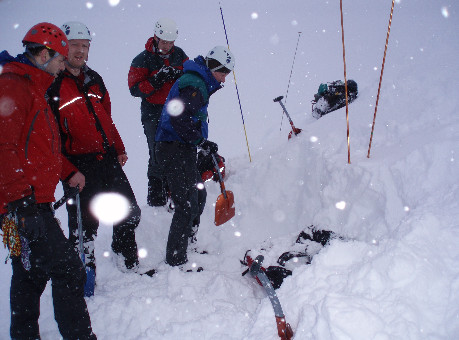
Mountain rescuers at an avalanche site on Buachaille Etive Mor
Teams are made up of committed mountaineers and hill walkers who live in the local area and who know their hills extremely well. As volunteers, they all offer their help and expertise to anyone in distress in the hills free of charge.
The Police have a statutory responsibility for any accident, including those on the hills, and it is the Police that coordinate a rescue. They can call upon a civilian team or helicopter assistance if they feel it is necessary.
The mountain rescue teams are also supported by the work of search dogs. There are two organisations in Scotland who provide search dog cover. These are SARDA Scotland and SARDA Southern Scotland.
We are fortunate to have free support in the event of an emergency, but it is our responsibility to be self-reliant and not call teams out unnecessarily.
It is the responsibility of mountaineers to be prepared for any eventuality. This means being committed to self-reliance from the outset. The mountain rescue service should never be viewed as a ‘free ticket off the hill’. Before calling 999 it should be very clear that you are unable to help yourself and that outside help is necessary. Unnecessary calls are costly for the teams and could divert resources away from a serious emergency.
If, however, you do require the assistance of mountain rescue, these pages give very useful advice:
For you, self-reliance means being able to cope with most eventualities that may befall you on the hill. For mountain rescue teams it means being called out less for trivial or unnecessary reasons. You owe it to yourself as well as your friends to be competent at what you are tackling and to cope with any misfortune to the best of your ability.